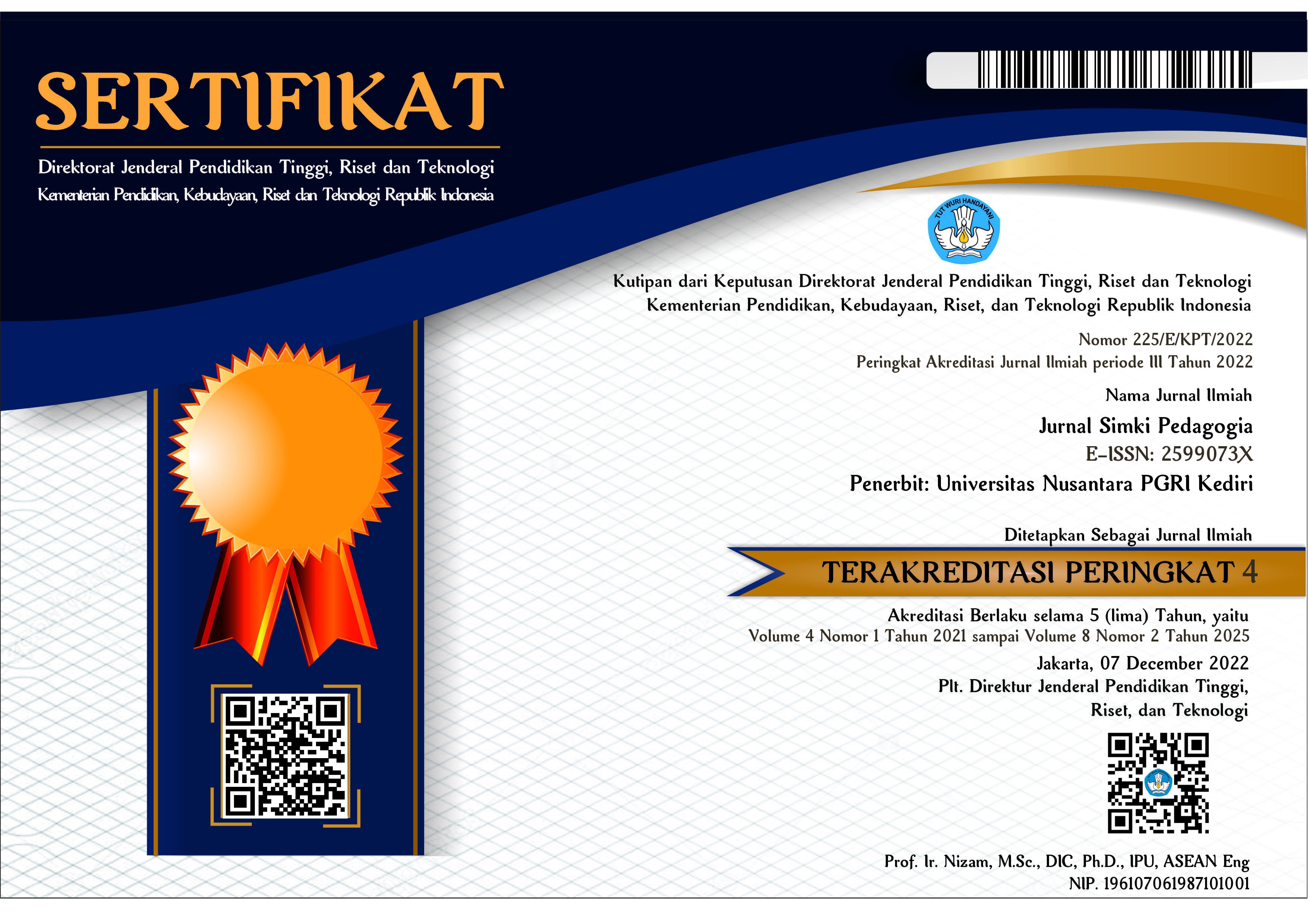Pengembangan Kinerja Guru Ditinjau dari Variabel Lingkungan Kerja dan Budaya Organisasi
 Abstract views: 395
,
Abstract views: 395
,
 PDF (Bahasa Indonesia) downloads: 315
PDF (Bahasa Indonesia) downloads: 315
Abstract
This explanatory research aims to determine the significance of the influence of work environment and organizational culture variables on teacher performance. The number of respondents involved were 51 teachers. The results of this study state that the work environment has a significant influence on teacher performance. Another independent variable, namely organizational culture also has a significant influence on teacher performance. The work environment becomes the independent variable that has the dominant influence. Simultaneously, the same thing also happened. The correlation between the independent and dependent variables is very strong.
Downloads
References
Ainley, J., & Carstens, R. (2018). Teaching and Learning International Survey (TALIS) 2018 conceptual framework, OECD working papers, No. 187. Paris: OECD Publishing. Lee, M., & Louis, K. S. (2019). Mapping a strong school culture and linking it to sustainable school improvement. Teaching and Teacher Education, 81, 84–96.
Badri, R., Amani-Saribaglou, J., Ahrari, G., Jahadi, N. & Mahmoudi, H. (2014). School culture, basic psychological needs, intrinsic motivation and academic achievement: Testing a casual model. Mathematics Education Trends and Research, 1-13.
Bhengu, T. T.& Mthembu, T. T. (2014). Effective leadership, school culture and school effectiveness: A case study of two ‘sister’ schools in Umlazi Township. Journal of Social Sciences, 38(1), 43-52.
Chang, G.H (2012). Coorporate culture and performance. New York, Free press
Collie, R. J., Shapka, J. D., & Perry, N. E. (2012). School climate and social–emotional learning: Predicting teacher stress, job satisfaction, and teaching efficacy. Journal of educational psychology, 104(4), 1189.
Darmawan, D. (2007). Budaya Organisasi dan Pengaruhnya terhadap Kebebasan Pengambilan Keputusan Manajerial, Jurnal Media Komunikasi Ekonomi dan Manajemen, Vol.5 No.2 Januari, 40-53.
Darmawan, D. (2010). Budaya Organisasi, Metromedia, Surabaya.
Darmawan, D. (2010). Pengaruh Kompetensi Kerja, Budaya Organisasi, Kepemimpinan dan Kompensasi terhadap Loyalitas Kerja, Jurnal Ilmu Sosial, Vol. 4, No. 2, 63-76.
Darmawan, D. (2012). Motivasi & Kinerja (Studi Sumber Daya Manusia), Metromedia, Surabaya.
Darmawan, D. (2015). Peranan Motivasi Kerja, Kedisiplinan, dan Lingkungan Kerja terhadap Kinerja Guru SD di Kecamatan Gempol Kabupaten Pasuruan, Jurnal Ilmiah Manajemen Pendidikan Indonesia, Vol.1 No.3 Maret, 113-122.
Darmawan, D. (2016). Peranan Motivasi Kerja, Komitmen Organisasi dan Budaya Organisasi terhadap Kepuasan Kerja, Jurnal Ilmiah Manajemen Pendidikan Indonesia, Vol.2 No.3 Maret, 109-118.
Darmawan, D. et al. (2020). The Quality of Human Resources, Job Performance and Employee Loyalty, International Journal of Psychosocial Rehabilitation, Vol. 24 Issue 3, 2580-2592.
Darmawan, D., E. A. Sinambela, M. Hariani, & M. Irfan. (2020). Analisis Komitmen Organisasi, Iklim Kerja, Kepuasan Kerja dan Etos Kerja yang Memengaruhi Kinerja Pegawai, Jurnal Bisnis dan Kajian Strategi Manajemen, Vol. 4 No. 1, 58-70.
Duan, Xiaoju. Xiangyun Du, & Kai Yu. 2018. School Culture and School Effectiveness: The Mediating Effect of Teachers’ Job Satisfaction, International Journal of Learning, Teaching and Educational Research, Vol. 17, No. 5, 15-25.
Malakolunthu, S., Idris, A.R. & Rengasamy, N.C. (2010). Teacher professional experience and performance: impact of the work environment and general welfare in Malaysian secondary schools. Asia Pacific Educ. Rev. 11, 609–617.
Malinen, O. P. & Savolainen, H. (2016). The effect of perceived school climate and teacher efficacy in behavior management on job satisfaction and burnout: A longitudinal study. Teaching and Teacher Education, 60, 144-152.
Mardikaningsih, R. (2014). Kinerja Karyawan dan Faktor-Faktor yang memengaruhinya, Jurnal Ilmu Sosial, Vol. 7, No. 2, 73-84.
Mardikaningsih, R. (2016). Variabel Kepemimpinan dan Lingkungan Kerja serta Pengaruhnya terhadap Kinerja Karyawan, Management & Accounting Research Journal, Vol.1 No.1 November, 55-62.
Mardikaningsih, R., S. Arifin, D. Darmawan, & M. Irfan. (2019). Pengaruh Pendidikan, Kemampuan Kerja dan Pengalaman Kerja terhadap Kinerja Karyawan, Jurnal Ekonomi Bisnis, Vol.12 No.1 Januari, 35-47.
Maslowski, R. (2001). School culture and school performance: An explorative study into the organizational culture of secondary schools and their effects. Twente, University Press.
Palembeta, Thoriq & S. Arifin. (2014). Pengaruh Penilaian Kinerja terhadap Motivasi Kerja, Jurnal Ilmiah Manajemen Pendidikan Indonesia, Vol.1 No.1 September, 23-32.
Putra, A. R., Eli Retnowati dan E. A. Sinambela. (2019). Pengaruh Komunikasi Kerja dan Integritas terhadap Kinerja Pegawai, Jurnal Ekonomi Bisnis, Vol. 12 No. 1 Januari, 23-34.
Powers, J. M. (2009). Charter schools: From reform imagery to reform reality. New York, Palgrave Macmillan.
Santosa, Aditya & D. Darmawan. (2002). Hubungan Kepemimpinan, Budaya Organisasi dan Kinerja Karyawan, Jurnal Ilmu Manajemen, Vol 3 No 2, 81-92.
Schein, E. H. (2011). Leadership and organizational culture. New York, Wiley.
Schoen, L. T. & Teddlie, C. (2008). A new model of school culture: A response to a call for conceptual clarity. School Effectiveness and School Improvement, 19(2), 129-153.
Sinambela, E. A. (2014). Pengaruh Motivasi, Disiplin dan Lingkungan Kerja terhadap Kepuasan dan Loyailtas Kerja, Jurnal Ilmu Sosial, Vol. 7, No. 3, 123-136.
Stearns, E., Banerjee, N., Mickelson, R. & Moller, S. (2014). Collective pedagogical teacher culture, teacher–student ethno-racial mismatch, and teacher job satisfaction. Social Science Research, 45, 56-72.
Stoll, L. (1999). School culture: Black hole or fertile garden for school improvement? In: Prosser, J. (ed.), School Culture. London, Paul Chapman (pp. 60-76).
Treputtharat, S. & Tayiam, S. (2014). School climate affecting job satisfaction of teachers in primary education, Khon Kaen, Thailand. Procedia-Social and Behavioral Sciences, 116, 996-1000.
Vadi, M. (2007). Relationships between organizational culture and performance in Estonian schools with regard to their size and location. Baltic Journal of Economics, 1, 3-17.
Van Beurden, J., Van Veldhoven, M., Nijendijk, K., & Van De Voorde, K. (2017). Teachers’ remaining career opportunities: the role of value fit and school climate. Teaching and Teacher Education, 68, 143–150.
Zakariya, Y. F., Goodchild, S., Bjørkestøl, K., & Nilsen, H. K. (2019). Calculus self-efficacy inventory: Its development and relationship with approaches to learning. Education Sciences, 9(3), 170.
Copyright (c) 2021 Samsul Arifin, Rahayu Mardikaningsih

This work is licensed under a Creative Commons Attribution 4.0 International License.

Jurnal Simki Pedagogia : https://jiped.org/index.php/JSP/index is licensed under a Creative Commons Attribution 4.0 International License.
















